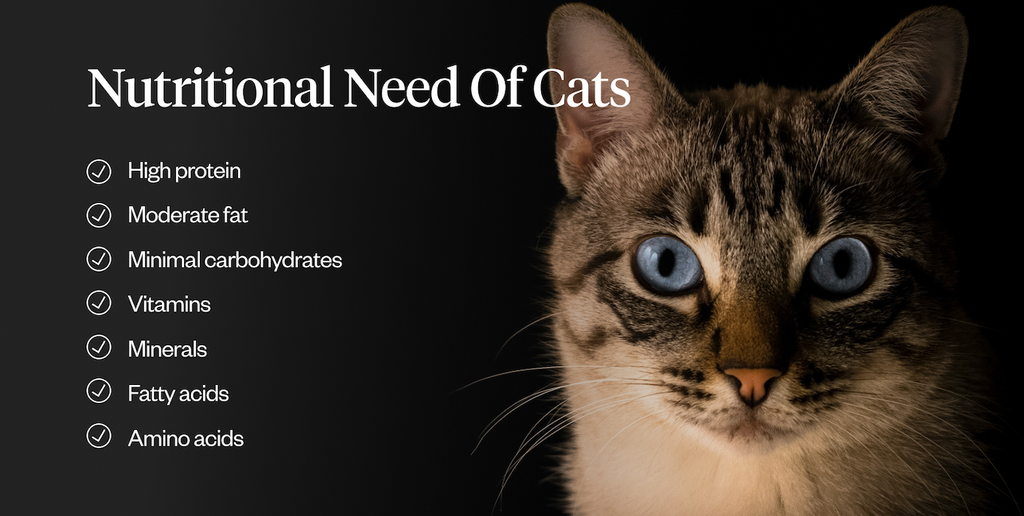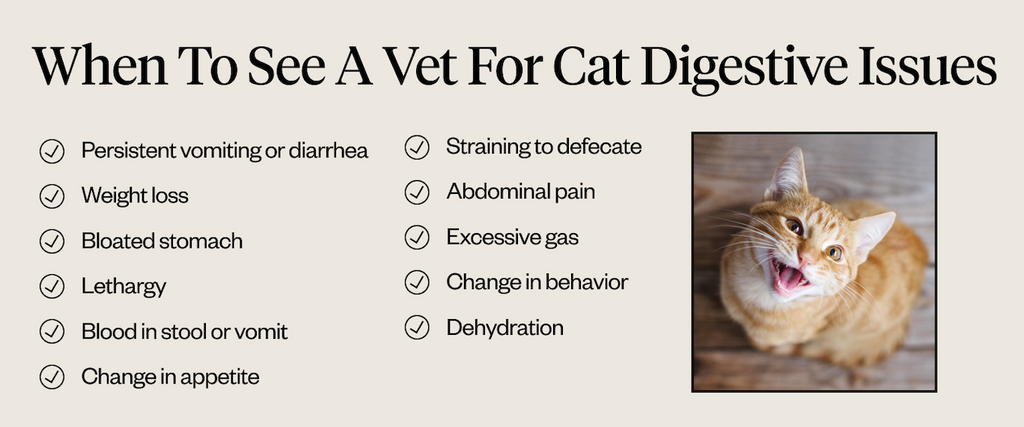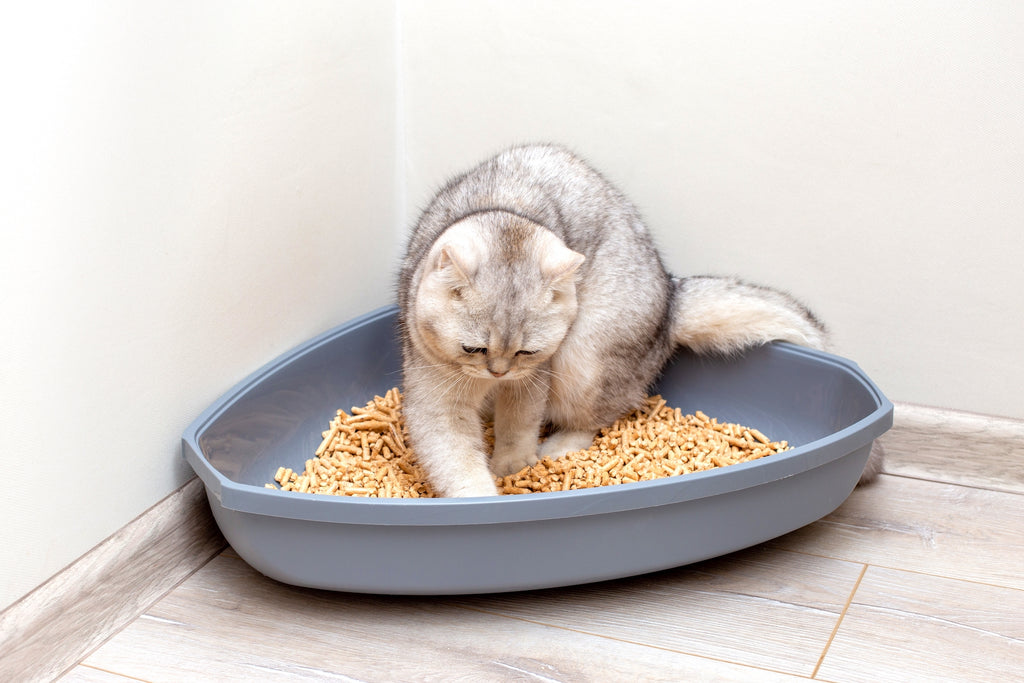10 Min Read
Common Cat Digestive Issues & What To Do
Key takeaway
Cat digestive issues can manifest in various ways, from vomiting to pancreatitis, and require prompt attention to ensure their wellbeing. Recognizing the symptoms early and seeking appropriate veterinary care is crucial.

Why pet owners are switching to online vet care with Dutch
-
Prescriptions delivered free to you
-
Fast access to Licensed Vets over video
-
Unlimited video visits and follow-ups
Cats, with their playful antics and soothing purrs, are a beloved part of many families. However, just like us humans, they can face a variety of digestive problems. As devoted pet parents, it's important for us to be well-informed about the most common cat digestive issues, from vomiting and diarrhea to gastroenteritis and pancreatitis. This includes knowing their causes, understanding how to effectively address them, and recognizing the signs that indicate a visit to the vet is necessary. Continue reading to learn more and ensure the health and wellbeing of your feline friend.
- Vomiting
- Diarrhea
- Constipation
- Hairballs
- Gastroenteritis
- Inflammatory Bowel Disease (IBD)
- Pancreatitis
- Gastric Foreign Bodies
- Preventing Cat Digestive Issues
- When To See A Vet
- Cat Digestive Issues: FAQs
- Final Notes
Vomiting
Vomiting is one of the most common cat digestive issues. It is a symptom that can be indicative of various underlying issues. While occasional vomiting might result from simple causes like overeating, frequent or severe vomiting can be a sign of more serious health concerns.
Some common causes of vomiting in cats include:
- Overeating: Consuming food too quickly or in large amounts
- Dietary Intolerance: Reaction to certain foods or sudden changes in diet
- Toxins: Ingestion of poisonous substances or plants
- Infections: Bacterial, viral, or parasitic infections affecting the digestive system
- Hyperthyroidism: Overactive thyroid glands can cause frequent vomiting
- Underlying diseases
Symptoms
As we’ve mentioned, vomiting in cats is a symptom itself. However, it is often accompanied by other signs such as diarrhea, lethargy, loss of appetite, and abdominal pain.
What To Do
If your cat is vomiting, first ensure they're in a safe and comfortable environment away from potential hazards. Monitor their behavior closely for any accompanying symptoms and withhold food for a short period, reintroducing a bland diet gradually. If the vomiting persists, appears severe, or is accompanied by other concerning signs, seek veterinary care as soon as possible.
Diarrhea
Diarrhea is another common cat digestive issue and can manifest due to a myriad of reasons. It's characterized by loose or watery stools and can be a sign of both minor and severe health conditions.
Some common causes of diarrhea in cats can include:
- Dietary indiscretion: Consuming spoiled food or non-food items
- Food intolerance or allergies: Adverse reactions to certain food ingredients
- Parasites: Such as roundworms, coccidia, and giardia
- Bacterial or viral infections: Including salmonella or feline panleukopenia
- Medications or toxins: Some drugs or ingested chemicals can upset the cat's stomach
- Underlying diseases
Symptoms
Diarrhea in cats is characterized by frequent, loose, or watery stools, which may sometimes contain blood or mucus. Accompanying symptoms can include lethargy, decreased appetite, abdominal pain, and an increased urgency to go to the bathroom.
What To Do
When your cat exhibits signs of diarrhea, it's essential to provide continuous access to clean water, as diarrhea can quickly lead to dehydration. Refrain from giving them their regular food and instead opt for a bland, easily digestible diet until the symptoms subside. If there's no improvement within a day or if the condition worsens, it's crucial to seek professional veterinary advice.
Constipation
Constipation is a condition in which cats have difficulty or are unable to pass feces. This can be uncomfortable and, if not addressed, could lead to more serious health problems.
Some common causes of feline constipation include:
- Dehydration: Insufficient water intake can lead to drier stools
- Dietary issues: Lack of fiber or sudden dietary changes
- Medications: Some drugs can affect bowel movements
- Underlying medical conditions: Such as neurological disorders, pelvic injuries, or tumors
Symptoms
If your cat is constipated, they can make frequent trips to the litter box only to stand there and strain to produce any feces. Additionally, in their litter box, you may find hard, dry stools that are much smaller than usual. A loss of appetite or lethargy often accompanies constipation in cats as well.
What To Do
If you want to know how to help a cat with digestive issues, especially a cat that’s constipated, here’s what you need to do. First, you can encourage water intake and consider introducing a wet-food diet to increase moisture content. Then, trying some gentle belly massages might help stimulate movement. However, if constipation persists or if your cat seems distressed, it's essential to visit a vet for proper diagnosis and treatment.
Hairballs
Hairballs, or trichobezoars, are clumps of ingested fur that cats sometimes vomit up. While occasional hairballs are common and usually not a cause for concern, frequent occurrences can indicate underlying problems.
If your cat is prone to hairballs, this may be why:
- Grooming: Regular grooming can lead to the ingestion of loose fur
- Long hair breeds: Such as Maine Coons or Persians, which might ingest more fur
- Shedding season: Cats tend to shed and groom more during spring and fall
- Dietary issues: A lack of fiber can reduce the movement of hair through the digestive system
Symptoms
Signs of digestive issues in cats, especially hairballs, include:
- Vomiting cylindrical masses of fur
- Retching or gagging without producing anything
- Decreased appetite
- Lethargy
- Constipation or diarrhea
What To Do
For cats often affected by hairballs, regular grooming to reduce loose fur can be beneficial. Consider feeding specialized cat foods designed to reduce hairballs, or supplements like malt paste that can ease their passage. If your cat seems to be struggling with frequent hairballs or shows signs of a blockage, speak with a vet for more information.
Gastroenteritis
Gastroenteritis refers to the inflammation of the stomach and intestines in cats. This condition can be acute or chronic and can result in various symptoms, depending on its severity and cause.
There can be many different causes of gastroenteritis in cats, including:
Symptoms
The common symptoms of gastroenteritis in cats are:
- Vomiting
- Diarrhea
- Loss of appetite
- Lethargy or weakness
- Dehydration or increased thirst
- Abdominal pain or discomfort
What To Do
If you suspect your cat has gastroenteritis, provide them with fresh water but limit food intake for several hours before reintroducing a bland, easily digestible diet such as boiled chicken and rice. Observing your cat's behavior, hydration level, and any changes in their stool or vomit is critical. Due to the potential complexities and severity associated with gastroenteritis, consult with a veterinarian as soon as possible for guidance and treatment recommendations.
Inflammatory Bowel Disease (IBD)
IBD is a chronic digestive issue in cats. It is characterized by the persistent inflammation of the gastrointestinal tract. This complex disorder can adversely affect a cat's quality of life and requires proper management.
If your cat has IBD, it can be caused by:
- Immune system response: May be caused by an overreaction to normal GI bacteria or dietary proteins
- Genetics: Some breeds or individual cats may be more susceptible
- Environmental factors: Stress or potential allergens can cause IBD in cats
Unfortunately, IBD can also manifest itself in cats without an apparent cause. Recognizing the symptoms of IBD is crucial to getting your cat the help they need
Symptoms
Chronic vomiting and diarrhea, weight loss, a decreased appetite, blood or mucus in the stool, lethargy, and changes in behavior are just some of the symptoms of IBD in cats.1
What To Do
If your cat displays signs consistent with IBD, regular monitoring and keeping a symptom diary can help track any triggers or patterns. However, due to the long-term implications and diagnostic complexity of IBD, establishing a partnership with a trusted vet for ongoing management and care is paramount.
Pancreatitis
Pancreatitis involves the inflammation of the pancreas, an essential organ responsible for producing digestive enzymes and insulin. In cats, both acute and chronic forms of this condition can emerge, each with its set of challenges.
Causes of chronic pancreatitis in cats include:
- Trauma: Physical injury to the abdominal area
- Medications: Some drugs can induce pancreatitis as a side effect
- Infections
- Toxins
- Metabolic disorders: Disorders such as hypercalcemia can cause pancreatitis
Symptoms
Cats with pancreatitis often exhibit a loss of appetite, vomiting, or diarrhea. Additional signs may include lethargy, dehydration, and noticeable abdominal pain or discomfort.
What To Do
If you suspect your cat may be suffering from pancreatitis, it's essential to provide a calm environment and monitor their food and water intake. Due to the potential severity of this condition and its overlapping symptoms with other diseases, a prompt consultation with a vet is crucial. Upon diagnosis, treatments may include fluid therapy, dietary changes, pain management, and in some cases, specific medications to address inflammation. Early intervention and appropriate care can greatly improve outcomes.
Gastric Foreign Bodies
When cats ingest objects that aren't easily digestible, these items can become lodged in their stomach or intestines, leading to what's referred to as a gastric foreign body. This can pose significant risks and can range from simple hairballs to more perilous obstructions like toys or strings.
This cat digestive issue is often a result of:
- Ingesting objects they play with, such as strings, toys, or small household items
- Hairballs
- Consuming bones or other hard to digest foods
- Eating trash or other debris they have access to
Symptoms
Cats with a gastric foreign body might show signs of persistent vomiting or attempts to vomit. They may also exhibit a reduced appetite, lethargy, abdominal pain, abdominal bloating or changes in bowel movements, including diarrhea or constipation.1
What To Do
Refrain from giving your cat food and limit their activity if you think they are experiencing intestinal blockage. Immediate veterinary attention is paramount, as some foreign bodies can cause severe complications or blockages. Diagnosis usually involves imaging such as X-rays, and treatments might range from inducing vomiting, endoscopic retrieval, to surgical intervention in more severe cases. Prompt action can significantly reduce associated risks.1
Preventing Cat Digestive Issues
To upkeep your cat’s digestive health, it's all about being proactive. Make sure they're eating right, drinking enough water, getting their regular brush-outs, and seeing the vet regularly.

Proper Diet
Prioritizing high-quality, nutrient-rich food for your cat is essential. If you know your cat has digestive issues , before committing to a specific brand, it's advisable to consider an allergy test to identify any sensitivities to common ingredients like chicken or wheat. When transitioning to a new diet, always do so gradually to minimize digestive disruptions. Additionally, refrain from offering your cat human foods, as many can be detrimental to their digestive system.
Hydration
Always ensure your cats have access to fresh water. Switching to wet food might also be a good way to boost their moisture intake.
Grooming
Regular grooming of your cat can reduce hair ingestion and decrease the occurrence of hairballs. Consider investing in deshedding combs and other specialized grooming tools for more efficient care as well.
Regular Vet Visits
Scheduling a yearly veterinary check-up for your cat is essential to ensure their overall health. During these visits, discuss any digestive concerns or unusual behaviors you've observed. The insights you gain can guide you on proactive measures and potential dietary adjustments to benefit your cat’s health and wellbeing.
When To See A Vet

Recognizing when to seek veterinary care is pivotal for a cat owner. If your cat exhibits prolonged or intense symptoms without improvement, it's advisable to consult a vet. Indicators such as dehydration, abdominal swelling, abrupt behavioral or appetite shifts, or the presence of blood in stool warrant immediate professional attention.
Cat Digestive Issues: FAQs
When should I be concerned about vomiting or diarrhea?
Speak with your vet if your cat's vomiting or diarrhea continues for over 24 hours. Should you observe blood in their urine or feces, or if digestive disturbances coexist with signs of dehydration or lethargy, it's crucial to consult with a vet promptly.
Should I be concerned about my cat's water intake?
Yes. Keeping an eye on your cat's water intake is crucial for their well-being. Dehydration might indicate underlying issues such as parasites, infections, gastroenteritis, or more severe conditions. If your cat remains reluctant to drink even after being offered fresh water, it's essential to reach out to your vet.
Are over-the-counter remedies safe for treating digestive issues?
Most over-the-counter and human remedies cannot be safely used for cats. Consult your vet before giving your cat any medication.

Final Notes
Navigating cat digestive issues requires knowledge and timely intervention. For comprehensive insights on this subject, turn to Dutch. By choosing Dutch, pet parents not only enhance their understanding of pet care but also gain easy and affordable access to licensed vets.
Share
References
-
Defarges, Alice. et al. “Disorders of the Stomach and Intestines in Cats.” Merck Veterinary Manual. Oct. 2022, https://www.merckvetmanual.com/cat-owners/digestive-disorders-of-cats/disorders-of-the-stomach-and-intestines-in-cats.



